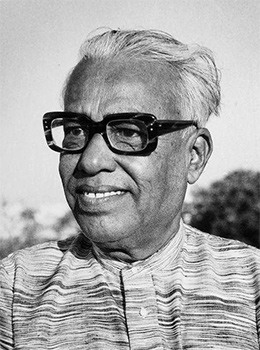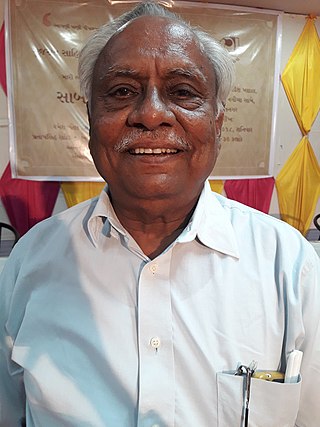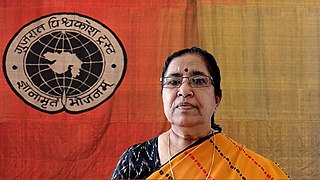Related Research Articles
The history of Gujarati literature may be traced to 1000 AD, and this literature has flourished since then to the present. It is unique in having almost no patronage from a ruling dynasty, other than its composers.

Narmadashankar Lalshankar Dave, popularly known as Narmad, was an Indian Gujarati-language poet, playwright, essayist, orator, lexicographer and reformer under the British Raj. He is considered to be the founder of modern Gujarati literature. After studying in Bombay, he stopped serving as a teacher to live by writing. During his prolific career, he introduced many literary forms in Gujarati. He faced economic struggles but proved himself as a dedicated reformer, speaking loudly against religious and social orthodoxy. His essays, poems, plays and prose were published in several collections. His Mari Hakikat, the first autobiography in Gujarati, was published posthumously. His poem Jai Jai Garavi Gujarat is now the state anthem of Gujarat state of India.

Rajendra Anantrai Shukla is a Gujarati poet. He taught at various places before voluntarily retiring. He published several poetry collections which won him several major Gujarati literary awards.

Ramesh Parekh (1940-2006) was a Gujarati poet and lyricist from Gujarat, India. He was one of the most popular poets of modern Gujarati poetry. Though government servant by profession, he had deep interest in literature and music. He contributed heavily in field of poetry including geet, ghazal and non-lyrical poetry. He also wrote stories and contributed in Gujarati children's literature.

Bhagwatikumar Sharma was an Indian author and journalist who wrote in Gujarati. Born in Surat and educated in languages, he edited a daily for several years. He wrote novels, short stories, poetry, essays and criticism. He received Ranjitram Suvarna Chandrak in 1984 and Sahitya Akademi Award in 1988.

Abdulgani Abdulkarim Dahiwala, popularly known as Gani Dahiwala was an Indian Gujarati poet.

Vinod Joshi is an Indian poet, writer and literary critic in Gujarati language from Gujarat, India. His notable works include Parantu, a collection of Geet, Shikhandi, a long narrative poem based on Shikhandi, a character from the Mahābhārata, Radio Natak: Swarup ane Siddhant, Tundil-tundika, a form of padyavarta, a Gujarati medieval literary genre, and Zalar Vage Zoothadi, a collection of poems. He is the recipient of the Jayant Pathak Puraskar (1985), Critic's award (1986), Kavishwar Dalpatram Award (2013), Sahitya Gaurav Puraskar (2015), Narsinh Mehta Award (2018), Kalapi Award (2018), Darshak Sahitya Sanman Award (2021), Narmad Suvarna Chandrak (2022) and Sahitya Akademi Award (2023).
Yogesh Joshi is a Gujarati language poet, short story writer, novelist, and editor from Gujarat, India. He is an editor of Parab, a publication of Gujarati Sahitya Parishad. His significant works include Avaajnu Ajavalu, Samudi, Motiba and Adhakhuli Baari. He was awarded the Narmad Suvarna Chandrak award for his book Motiba.

Dhwanil Ravindrabhai Parekh is a Gujarati language poet, critic and playwright from Gujarat, India. His significant works include Dariyo Bhalene Maane, Antim Yuddha and Sanket. He won Yuva Puraskar of Sahitya Akademi, New Delhi for his work Antim Yuddha in 2011. He is also a recipient of Yuva Gaurav Puraskar of 2008 instituted by Gujarat Sahitya Akademi.

Chandrakant Sheth was an Indian Gujarati poet, essayist, critic, translator and editor from Gujarat. His pen names include Aryaputra, Nand Samavedi, Balchadra and Daksh Prajapati. He won the Sahitya Akademi Award for Gujarati in 1986 for his book Dhoolmani Paglio.

Anil Joshi is a Gujarati language poet and essayist from Gujarat, India. He won Sahitya Akademi Award for Gujarati in 1990 for his essay collection Statue (1988). His significant works include Kadach, Barafna Pankhi and Pavan Ni Vyaspithe.

Ashokpuri Goswami is a Gujarati poet and writer from Gujarat, India. He won Sahitya Akademi Award for Gujarati language in 1997 for his novel Koovo (1994).

Jayant Himmatlal Pathak was a Gujarati poet and literary critic from Gujarat, India. He was the president of the Gujarati Sahitya Parishad from 1990 – 1991. He received several awards, including the Sahitya Akademi Award, the Kumar Suvarna Chandrak, the Narmad Suvarna Chandrak, the Ranjitram Suvarna Chandrak and the Uma-Snehrashmi Prize. The Jayant Pathak Poetry Award is named after him.
Pramodkumar Bhagubhai Patel (1933–1996) was Gujarati language critic from Gujarat, India.
Mukul Choksi is a Gujarati poet, psychiatrist and sexologist from Angat Clinic Surat, Gujarat, India. He is known for his ghazal poetry in Gujarati literature.

Dhansukhlal Krishnalal Mehta was a Gujarati writer from Gujarat, India. He is considered a pioneer of Gujarati short stories. He is known for his humorous novel Ame Badha, co-written with Jyotindra Dave. He received the Gujarati literary awards Ranjitram Suvarna Chandrak in 1940 and the Narmad Suvarna Chandrak in 1957.

Vijay Ramanlal Shastri is an Indian Gujarati language short story writer, novelist, critic and translator. He was educated and worked at the M. T. B. Arts College in Surat and has written more than two hundred short stories in addition to several works of criticism.
Jawahar Ravirai Bakshi is a Gujarati poet from Gujarat, India.

Sharifa Vijaliwala is an Indian Gujarati language writer, critic, translator and editor from Surat, Gujarat, India. She is a recipient of a 2018 Sahitya Akademi Award for Vibhajanni Vyatha, a collection of critical essays in Gujarati, and has won several Gujarat Sahitya Akademi awards for her literary work.
Ratan Rustom Marshal was a Parsi social worker and litterateur. He was the first person to receive a PhD degree in Gujarati language for his dissertation, Gujarati Patrakaratvano Itihas, in which he has chronicled the history of Gujarati journalism from the 19th century. His research is considered to be the original reference book of Gujarati journalism. He was awarded the Narmad Suvarna Chandrak for his autobiography in 1999.
References
- 1 2 3 4 5 6 7 8 Brahmabhatt, Prasad (2010). અર્વાચીન ગુજરાતી સાહિત્યનો ઈતિહાસ – આધુનિક અને અનુઆધુનિક યુગ[History of Modern Gujarati Literature – Modern and Postmodern Era] (in Gujarati). Ahmedabad: Parshwa Publication. pp. 238–241. ISBN 978-93-5108-247-7.
- 1 2 Jani, Suresh B. (12 July 2007). "રવીન્દ્ર પારેખ" [Ravindra Parekh]. ગુજરાતી પ્રતિભા પરિચય (in Gujarati). Retrieved 4 July 2018.
- ↑ Desai, Rakesh, ed. (2011). Society and Literature: Narmad in Critical Discourse. Surat: Veer Narmad South Gujarat University. p. 394. ISBN 978-81-921045-0-8.